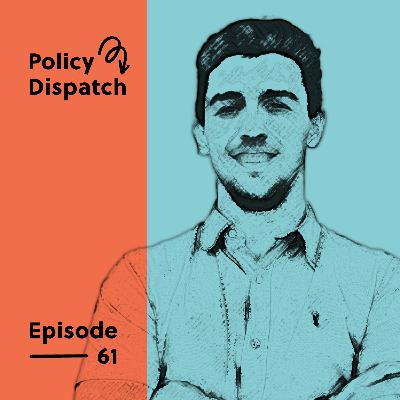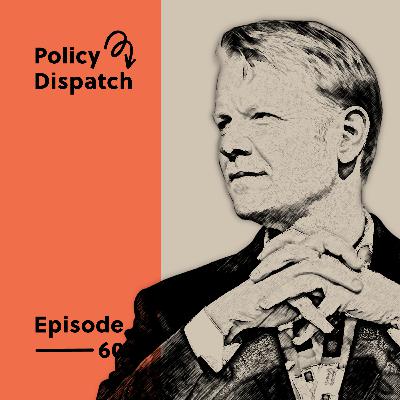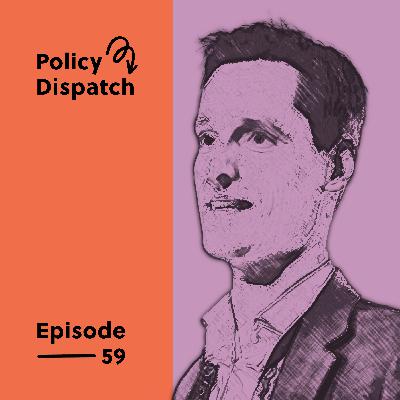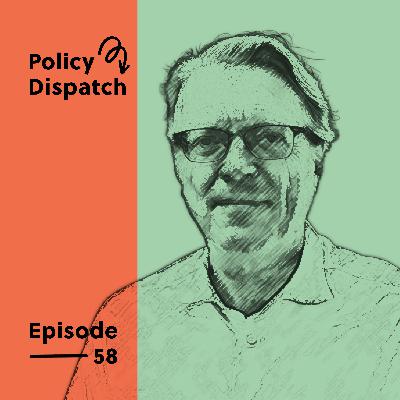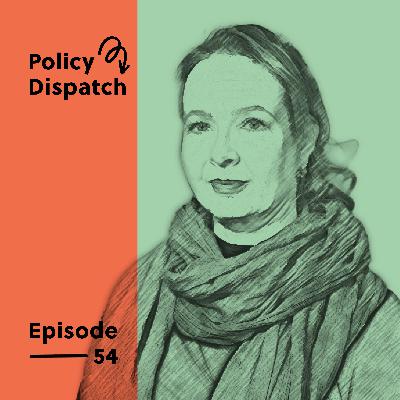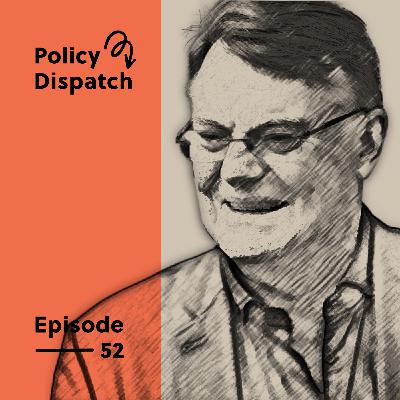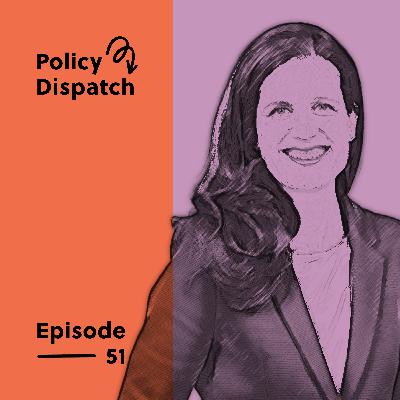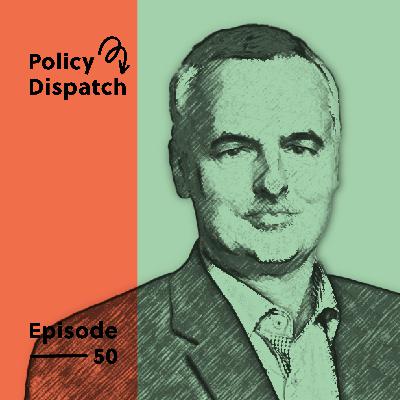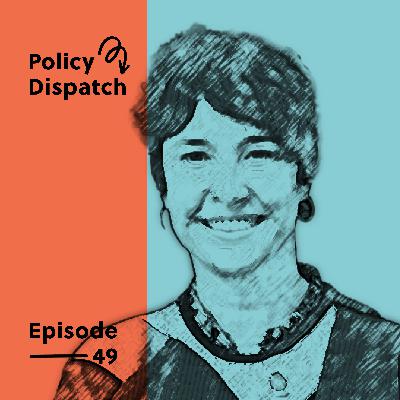Discover Policy Dispatch: The FORESIGHT podcast on the policies underpinning the energy transition
Policy Dispatch: The FORESIGHT podcast on the policies underpinning the energy transition

Policy Dispatch: The FORESIGHT podcast on the policies underpinning the energy transition
Author: FORESIGHT Media Group
Subscribed: 7Played: 216Subscribe
Share
© FORESIGHT Media Group 2022
Description
From FORESIGHT Climate & Energy, Policy Dispatch is a podcast all about the policies that underpin the energy transition. This is what will make or break the global decarbonisation effort. Through biweekly, short-but-sweet episodes, the Policy Dispatch will aim to explain what governments in the globe’s key markets are doing to boost clean energy and create sustainable ecosystems.
Hosted on Acast. See acast.com/privacy for more information.
59 Episodes
Reverse
Download our award-winning app and enjoy access to all exclusive features. Click here to access on Apple or Android.“This isn’t a new concept. This isn’t a revolutionary, ground-breaking concept. It’s just something that is kind of a repackaging of a market that’s not doing what it’s supposed to.” The United Kingdom has finally wrapped up a long-lasting review of its electricity market, opting to preserve the existing nationwide model instead of switching to a regional-based system. Reforming the market is essential to meet climate targets, add more renewables into the system and, ultimately, allow the government to hit its clean power goal in 2030. But it is still not entirely clear how the existing system will now be reformed. We know that moving to a so-called zonal system will not happen under this review, but there is still a lack of clarity on which policies will be adopted. “We’re going to push all these levers, we’re going to try and move things around, and instead of actually fundamentally fixing the problem at the source, driving down bills, we are essentially playing Jenga. We are removing blocks from the bottom, repackaging them and putting them back on the top. All the while eroding the integrity of the system so that one thing could just knock it all over.” Joining Sam on this episode of the Policy Dispatch is Sam Whitworth, energy market regulation adviser at British energy company Octopus. Download our award-winning app and enjoy access to all exclusive features. Click here to access on Apple or Android. Hosted on Acast. See acast.com/privacy for more information.
Download our award-winning app and enjoy access to all exclusive features. Click here to access on Apple or Android“We need to drive electrification in the EU. We are badly lagging behind China but we have done the hard work over the last 20 years to make really rapid electrification possible.” Electrification offers a viable path towards decarbonisation. If processes can be switched up to run on electrons, then renewable power generation can be hooked up to a wide range of previously polluting industries and sectors. Big leaps forward in terms of what can be electrified but also how much of the economy can be electrified have been made but more progress is needed. More clean power sources, more electricity network infrastructure and more investment are all, of course, crucial. “Without question, electrification is the single lever that will deliver us the furthest along the lines for our 2040 targets. There’s no question.” Joining Sam on this episode of the Policy Dispatch is Adrian Hiel, director of the Electrification Alliance, a group that advocates for electricity to play a crucial role in decarbonising Europe’s economy. Adrian shares his view on why getting more cheap electrons into the European energy system is only a good thing, what needs to be done to turbocharge that process and why electrification might only be gradual at first, but ultimately will happen at pace. Enjoy the show! For more on electrification, check out: The Electrification Alliance The International Energy Agency’s 2025 report on electricity. Download our award-winning app and enjoy access to all exclusive features. Click here to access on Apple or Android Hosted on Acast. See acast.com/privacy for more information.
Download our award-winning app and enjoy access to all exclusive features. Click here to access on Apple or Android.“I like to say that the German storage market doesn’t work because of policy but despite policy sometimes! Lars Stephan,” Senior Manager Policy and Market Development, Fluence. Germany’s energy storage market has been up and running for a decade and is just now starting to really ignite and cross some exciting milestones. More and more projects are starting to be announced, construction is beginning and the German grid is starting to feel the benefit of having power storage backup when it is really needed. “So if we look at the project scale at the moment, we have about 2 to 2.7 GWh of utility-scale energy storage projects deployed in Germany. And we have about 6.6 GWh of projects under construction that will come online by January 2027.” Lots of policy changes are under consideration that will impact this market. From removing grid fee exemptions and setting up capacity markets to offering inertia services revenues. If Germany gets it right, the sector could boom. If it gets it wrong… “Like with inertia, energy storage can be part of the solution, but you need to let us be part of the solution, by defining some kind of market mechanism that provides a price signal for energy storage. So it knows what to do, what not to do, in order to support the grid.” Joining Sam on this episode of the Policy Dispatch is Lars Stephan, head of policy and market development at energy storage software developer Fluence. Enjoy the show! For more on storage, check out: Rystad Energy’s global storage outlook; ‘Storage needs a loud revolution’, an audio oped by SolarPowerEurope; ‘Playing the long-duration storage game’, episode of The Jolt Stay tuned for a new in-depth article on storage as well!Download our award-winning app and enjoy access to all exclusive features. Click here to access on Apple or Android. Hosted on Acast. See acast.com/privacy for more information.
Download our award-winning app and enjoy access to all exclusive features. Click here to access on Apple or Android.Central and Eastern Europe needs to upgrade its building stock to plug leaks and reduce energy consumption. Some of the challenges the region faces are similar to those in other countries, some are more specific. Rules and regulations are slowly but surely being adopted in this part of the world, funding streams are coming online and renovation support schemes are being designed. Plenty of challenges like access to skilled labour still need to be addressed but all of the seeds have now been planted, hopefully a bumper harvest of higher renovation rates can be collected. Adrian Joyce, secretary-general of Efficient Buildings Europe, joins the show to discuss how policies have evolved over the last two years and whether he is indeed optimistic about the sector’s progress. This episode was recorded live at the biannual C4E Forum in the Croatian town of Cavtat. To listen to the previous episode recorded in 2023 during the last edition, click here. Enjoy the show! Download our award-winning app and enjoy access to all exclusive features. Click here to access on Apple or Android. Hosted on Acast. See acast.com/privacy for more information.
Download our award-winning app and enjoy access to all exclusive features. Click here to access on Apple or Android.Europe’s energy market is a marvel of the modern world, connecting more than 600 million people together. It has helped increase energy security and is boosting the rollout of green and cheap power. But the job is not done yet. More cross-border and regional cooperation is needed in order to take the energy market to the next level and allow countries to stand a chance of hitting their climate targets. Øyvind Vessia, head of strategic regulatory projects at Ørsted, joins this week’s show to discuss the challenges facing regional cooperation, the risks that could be unleashed if more collaboration is not forthcoming and the benefits it promises to unlock. This is a special live recording from WindEurope’s annual event in Copenhagen, produced in April 2025. Enjoy the show! Download our award-winning app and enjoy access to all exclusive features. Click here to access on Apple or Android. Hosted on Acast. See acast.com/privacy for more information.
Download our award-winning app and enjoy access to all exclusive features. Click here to access on Apple or Android.The shipping sector is aiming to go net-zero by 2050. But to hit that lofty target, a number of policies will have to be implemented in order to get cleaner-burning fuels into circulation. It requires a complete renewal of the industry’s way of doing business but progress is being made. Talks at the International Maritime Organisation in April resulted in an agreement on a number of measures that should help reduce emissions. Jesse Fahnestock, Director of Decarbonisation at the Global Maritime Forum (GMF), joins this episode to explain what was agreed, how it will affect the industry and what the next steps look like. Enjoy the discussion!Download our award-winning app and enjoy access to all exclusive features. Click here to access on Apple or Android. Hosted on Acast. See acast.com/privacy for more information.
Download our award-winning app and enjoy access to all exclusive features. Click here to access on Apple or Android.Decarbonisation objectives rely heavily on offshore wind providing cheap green electricity to power homes, infrastructure and businesses. Turbines are being built out at sea at pace but more effort is needed in order to hit Europe’s lofty goals. A recent bumpy patch of uncertainty has held the sector back to an extent and now the best way forward is being charted by the industry. Jakob Forman, lead regulatory advisor at Ørsted joins the show to share the findings of a new study aimed at proposing solutions to some of the sector’s main challenges. Jakob sat down with Sam at WindEurope’s recent annual conference in Copenhagen. Enjoy the discussion!Download our award-winning app and enjoy access to all exclusive features. Click here to access on Apple or Android. Hosted on Acast. See acast.com/privacy for more information.
Download our award-winning app and enjoy access to all exclusive features. Click here to access on Apple or Android.Most of Finland’s electricity is sourced from carbon neutral energy sources as the country aims to go completely net-zero by 2035. So great are its decarbonisation ambitions that Finland wants to be carbon negative by 2050. Helena Sarén, head of the Zero Carbon Future Mission at Business Finland joins the Policy Dispatch to lift the lid on how Finland has managed to steal such an impressive green march on other European countries. Enjoy the discussion!Download our award-winning app and enjoy access to all exclusive features. Click here to access on Apple or Android. Hosted on Acast. See acast.com/privacy for more information.
Download our award-winning app and enjoy access to all exclusive features. Click here to access on Apple or Android.Buildings are at the heart of the energy transition. They soak up a lot of energy and spew out a lot of emissions. Improving the existing stock and making sure new builds are as green as possible is crucial to our global decarbonisation journey. Across the continent of Africa, this challenge is playing out. New builds are the focus and policies are being developed constantly to weave sustainability factors into building codes and practices. Mugure Njendu, Africa Programs Lead at the Global Buildings Performance network, joins the Policy Dispatch to explain why the continent has a massive opportunity to build better and not make the same mistakes European countries have made in the past. Enjoy the discussion!Download our award-winning app and enjoy access to all exclusive features. Click here to access on Apple or Android. Hosted on Acast. See acast.com/privacy for more information.
Download our award-winning app and enjoy access to all exclusive features. Click here to access on Apple or Android.The energy transition is becoming more and more complex, new technologies are coming online, old ways of sourcing power are becoming obsolete and geopolitics are tearing up the rulebook. That is why the ability to plan ahead, work through all the options, find the opportunities in our shift toward a greener world and pick as many winners as possible is a skill worth its weight in gold. Jeremy Bentham headed the scenario team at Shell for well over a decade and on this edition of the show he shares his experience, what it taught him about the energy transition and how scenario planning is evolving in our changing world. Enjoy the discussion! If you would like to read more of Jeremy’s thoughts and analysis on the energy transition and wider societal issues, check out his newsletter here.Download our award-winning app and enjoy access to all exclusive features. Click here to access on Apple or Android. Hosted on Acast. See acast.com/privacy for more information.
Download our award-winning app and enjoy access to all exclusive features. Click here to access on Apple or Android.Not all hydrogen is created equally and not all proposed uses for hydrogen deserve the time of day. Potential applications for the fuel are gradually becoming narrower and more targeted as policymakers and industry get serious about using it. Helen Spence-Jackson, executive director at the Environmental Defense Fund Europe, joins the show to explain how new rules are shaping hydrogen’s future course, what else needs to be developed from a policy standpoint and why hydrogen shouldn’t be spread on toast. Enjoy the show!Download our award-winning app and enjoy access to all exclusive features. Click here to access on Apple or Android. Hosted on Acast. See acast.com/privacy for more information.
Download our award-winning app and enjoy access to all exclusive features. Click here to access on Apple or Android.Artificial intelligence could make or break the energy transition. The massive data centres that provide AI’s computational power will need to increase in number, which will result in a spike in energy demand. But the benefits that AI promises to bring to the energy transition could result in a net-positive for both the power system and the climate, if the right policies and framework are put in place. Peter Weckesser, chief digital officer at Schneider Electric, joins the show to explain how artificial intelligence should be harnessed, how we should manage the risks linked to its usage and what the energy transition stands to gain. Enjoy the show! Many thanks to all of our guests and listeners who have been with us for the last 50 episodes of the Policy Dispatch!Download our award-winning app and enjoy access to all exclusive features. Click here to access on Apple or Android. Hosted on Acast. See acast.com/privacy for more information.
Download our award-winning app and enjoy access to all exclusive features. Click here to access on Apple or Android.Heating our homes and cooling our casas is a vital part of everyday life that is often taken for granted. We expect heat and, increasingly, demand cooling. But the energy needs and carbon footprint of heating and cooling are huge. Both are expected to grow if strong policies are not put in place to help electrify and increase the share of renewable power. It is a problem that has been around for a while, so what is being done to address it? And will 2025 be a crucial year to turn talk into actual action? Mónica Vidal, a heating expert and campaigner at Climate Action Network Europe joins the show to help answer these questions and share her view on what policymakers need to be prioritising. Enjoy the discussion!Download our award-winning app and enjoy access to all exclusive features. Click here to access on Apple or Android. Hosted on Acast. See acast.com/privacy for more information.
Download our award-winning app and enjoy access to all exclusive features. Click here to access on Apple or Android.The 54 countries that make up Africa face some of the same energy and climate challenges as nations in the Americas, Europe and Asia, but in many cases the hurdles and obstacles are more varied and more difficult to overcome. Climate breakdown will hit African communities harder than those on other continents, making the need for effective climate finance in particular absolutely vital. How it is spent is crucial though. For this final episode of 2024, Sam is joined by Lily Odarno, director of the Africa innovation program at the Clean Air Task Force, to discuss this issue and more. Enjoy the show!Download our award-winning app and enjoy access to all exclusive features. Click here to access on Apple or Android. Hosted on Acast. See acast.com/privacy for more information.
Download our award-winning app and enjoy access to all exclusive features. Click here to access on Apple or Android.More than half of the world’s total supply of renewable energy is provided by bioenergy, a fact often forgotten in energy transition debates. Its contribution to sectors like heating is, in particular, an integral part of the energy mix. How does the sector manage the fact that it flies under the radar so much? What will new policymakers in Brussels do to regulate the sector? And what else does the future hold for bioenergy? To answer those questions and more, Irene di Padua, policy director at Bioenergy Europe, joins the show for a discussion about all things bio. Enjoy the episode!Download our award-winning app and enjoy access to all exclusive features. Click here to access on Apple or Android. Hosted on Acast. See acast.com/privacy for more information.
Download our award-winning app and enjoy access to all exclusive features. Click here to access on Apple or Android.Waste-to-energy power generation in Europe is not insignificant. More than 5 gigawatts of capacity is installed and there are plans in some countries to add more. The negative impact on the environment, climate and human health is well-documented: the emissions are often worse than fossil fuel combustion and the pollutants released by burning garbage can pose a significant health risk. So why is this practice still allowed? What rules are in place to regulate the sector? How is the industry evolving? And what does the future hold for waste incineration? Zero Waste Europe’s Janek Vähk joins this episode of the Policy Dispatch to discuss those points and much more. Enjoy the discussion!Download our award-winning app and enjoy access to all exclusive features. Click here to access on Apple or Android. Hosted on Acast. See acast.com/privacy for more information.
Download our award-winning app and enjoy access to all exclusive features. Click here to access on Apple or Android.Emission reductions are the primary way to address climate change. But if the international community is not able to slash greenhouse gases quickly enough or if leftover emissions persist, then the climate may still need a helping hand. That is where geoengineering may eventually come into play. Potential solutions include mass tree planting, capturing carbon, making clouds and the oceans more reflective, covering deserts in white plastic and other unconventional technologies. The scope for temperature reduction is huge but so is the risk of unleashing unpredictable side-effects. Researchers have to proceed with caution in order not to fail in their well-intentioned missions or even make the climate crisis worse. Lisa J. Graumlich, president of the American Geophysical Union, joins the show to present a new ethical framework the scientific community has put together and explain why its principles are oh so important moving forward. Enjoy!Download our award-winning app and enjoy access to all exclusive features. Click here to access on Apple or Android. Hosted on Acast. See acast.com/privacy for more information.
Download our award-winning app and enjoy access to all exclusive features. Click here to access on Apple or Android.Removing CO2 from the atmosphere is set to be big business in the coming years. Johan Börje joins the show to explain what is needed to scale carbon removals up and what challenges need to be overcome. Carbon removals will be crucial in the fight to combat climate change, as excess CO2 will have to be removed from the atmosphere in massive quantities. Efforts are underway to scale up this still nascent industry and policies are starting to take shape around the sector. Johan Börje from Stockholm Exergi, one company looking to be a frontrunner in carbon removing, joins this episode to shed some light on what the sector needs from policymakers and what kind of clients are looking to take advantage of their services. Enjoy the episode! Download our award-winning app and enjoy access to all exclusive features. Click here to access on Apple or Android. Hosted on Acast. See acast.com/privacy for more information.
Download our award-winning app and enjoy access to all exclusive features. Click here to access on Apple or Android.Transport’s electrification is gathering pace but it’s not quick enough for some. 2024 has been branded a disappointing year for EV sales and some have even suggested that this is the beginning of a dip. But is this true? Or is 2024 just a small bump in the road? And where do we stand on issues like charging infrastructure? Jaap Burger, an electric vehicles expert and senior advisor at the Regulatory Assistance Project, joins this week’s episode to shed some light on those questions. Enjoy the show and leave a comment in the contribution section below with your thoughts about e-mobility!Download our award-winning app and enjoy access to all exclusive features. Click here to access on Apple or Android. Hosted on Acast. See acast.com/privacy for more information.
Download our award-winning app and enjoy access to all exclusive features. Click here to access on Apple or Android. Look out of a plane window when you are flying over the sea or peer at the horizon from a ferry these days and chances are good that you will see giant wind turbine blades looming out of the deep. Offshore wind is generating more and more of our clean electricity, as governments around the world craft ever-increasingly ambitious renewable strategies. In Europe alone, countries want to roll out 111 gigawatts of the technology by 2030. But someone has to build these behemoths. The newest generation of turbines are hundreds of metres tall and hundreds of tonnes in weight. The infrastructure challenge is massive. New technologies like floating wind, larger capacity turbines and hybrid projects that include solar and hydrogen generation all mean that the challenge is only going to get more complicated. Mikkel Gleerup, CEO of wind turbine installer Cadeler, joins the show to share his experience from the frontlines of the energy transition and explain what is needed from governments to get more turbines in the water. Enjoy the discussion!Download our award-winning app and enjoy access to all exclusive features. Click here to access on Apple or Android. Hosted on Acast. See acast.com/privacy for more information.


